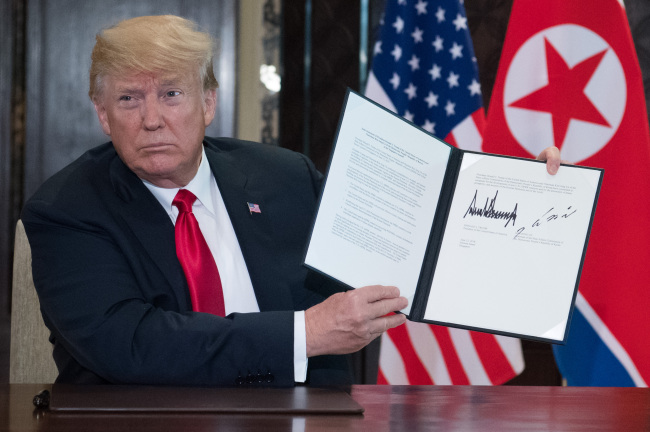The US hinted at adopting a “front-loaded” model in the early stage of North Korea’s denuclearization at the recent US-North Korea summit, a think tank affiliated with the South Korean spy agency said Thursday, which requires the North to swiftly transfer all its nuclear arsenal to the US.
US President Donald Trump and North Korean leader Kim Jong-un reached an agreement on the North’s denuclearization at Tuesday’s historic summit in Singapore, in which Kim pledged to work toward denuclearization and Trump promised security guarantees for the North in exchange. The inked agreement, however, lacked significant details on how they plan to carry out their pledges.
 |
| US President Donald Trump holds up a document he just signed during a document signing ceremony attened by North Korean Chairman Kim Jong-un during their historic US-North Korea summit, at the Capella Hotel on Sentosa Island, Singapore, 12 June 2018. (Yonhap) |
Citing Trump’s recent remark that “there will be a point at which, when you’re 20 percent through (the denuclearization process), that you (North Korea) can’t go back,” analysts at the Institute for National Security Strategy cited as a sign that the US will seek a “front-loaded process.” Trump had made the remark at the news conference following Tuesday’s summit.
He also said “we don’t know” how long exactly it might take for North Korea to get 20 percent into the denuclearization process, or what specific steps constitute that level of progress, “but it will happen pretty quick.”
The INSS said the US has set “20 percent” of the entire denuclearization process as a standard for “irreversible” denuclearization. It has been demanding the North dismantle its nuclear program in a complete, verifiable, and irreversible manner.
A front-loaded process in this case means North Korea’s abandonment of key parts of its nuclear weapons program at the outset, including warheads, materials and intercontinental ballistic missiles, according to the INSS. This will be done in exchange for US incentives such as security guarantees and normalization of ties, it added.
“But what must be addressed is how the US will offer a complete, verifiable, irreversible guarantee of the North’s regime security in return,” Lee Soo-hyoung, an analyst at the INSS said.
“North Korea continues to doubt whether the security guarantee will stay permanent. A majority support from the US Congress is needed for a more permanent guarantee, but it will be difficult because the US political sphere is extremely polarized – which is why the Sentosa agreement fell short of mentioning ‘CVIG.’”
The think-tank also noted that both sides will be able to discuss “bold follow-up measures” on removing the key parts of the North’s nuclear weapons program, as Washington and Pyongyang have already held a series of high-level and working-level talks leading up to the summit.
Regarding the planned follow-up negotiations with US Secretary of State Mike Pompeo on denuclearization, the INSS said that North Korea’s Foreign Minister Ri Yong-ho is likely to be Pompeo’s counterpart. Ri was among Kim‘s aides who accompanied the North Korean leader to Singapore.
The reclusive nation is also likely to have formed a task force of its party and military officials to implement summit agreements. It is expected to be supervised by the North’s former military intelligence chief and one of Kim Jong-un’s closest aides Kim Yong-chol or Ri.
Meanwhile, former Unification Minister Lee Jong-suk, speaking at a forum hosted by private think-tank Sejong Institute, said that North Korea is expected to take measures to denuclearize within the next two to three weeks.



